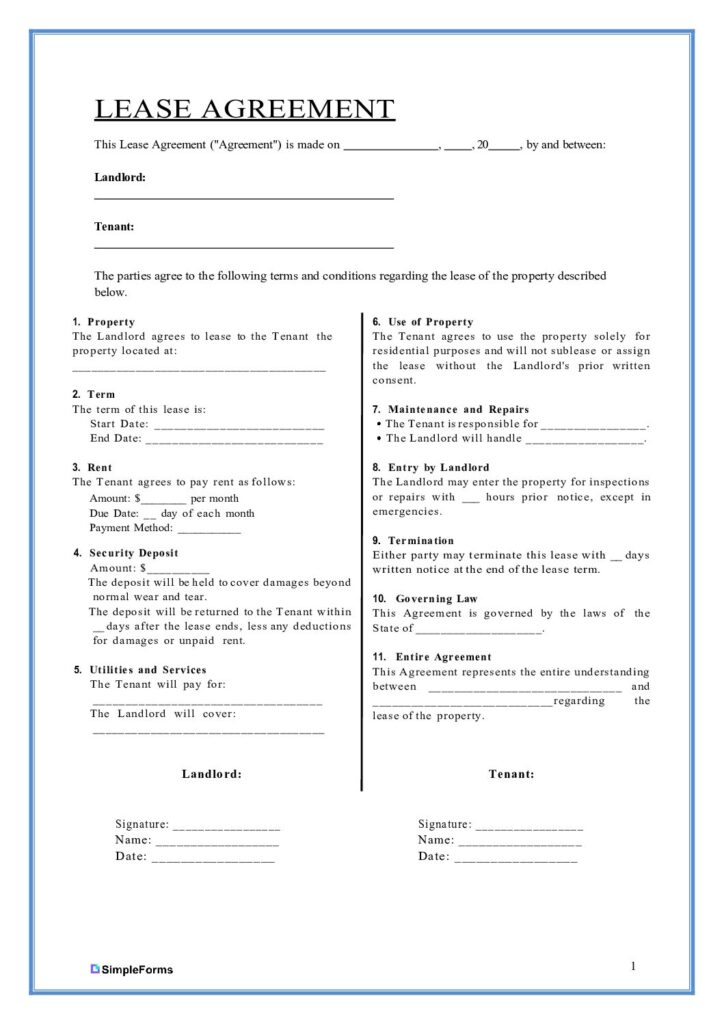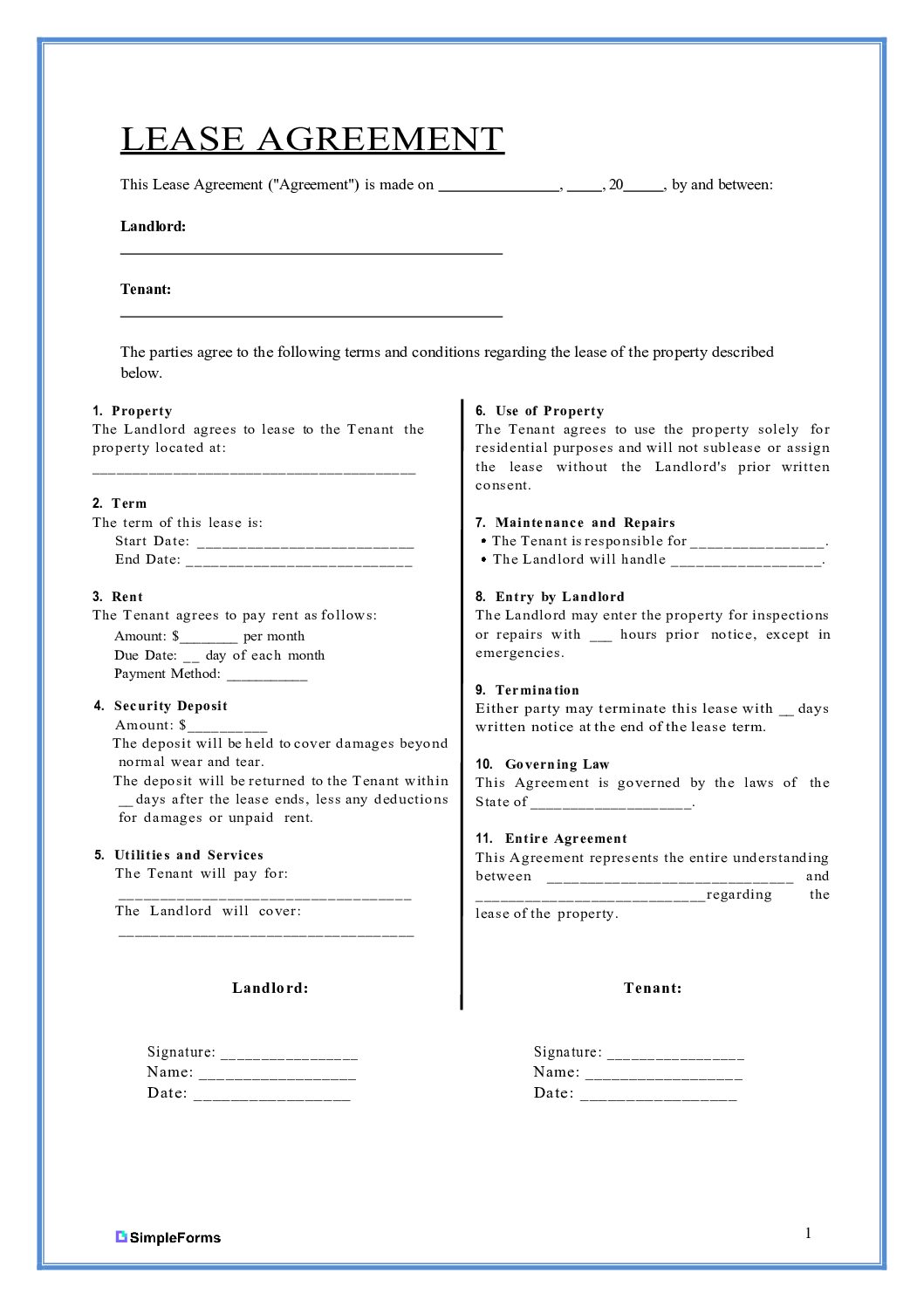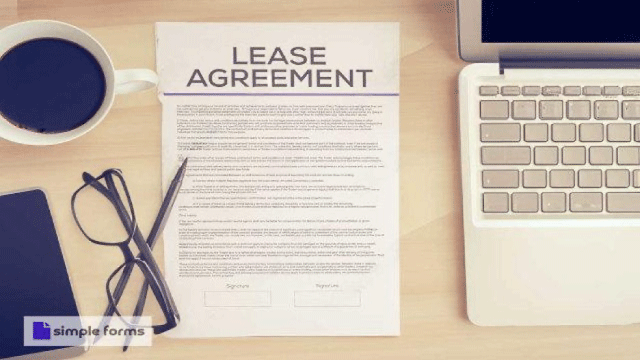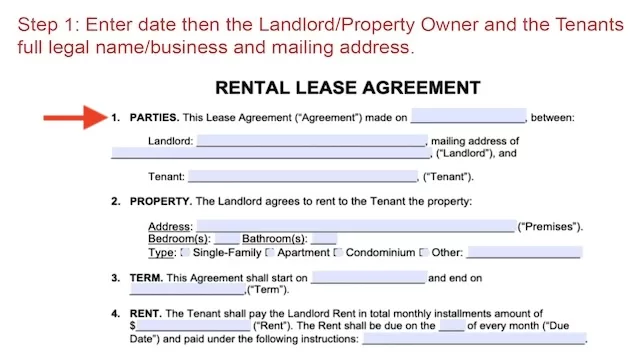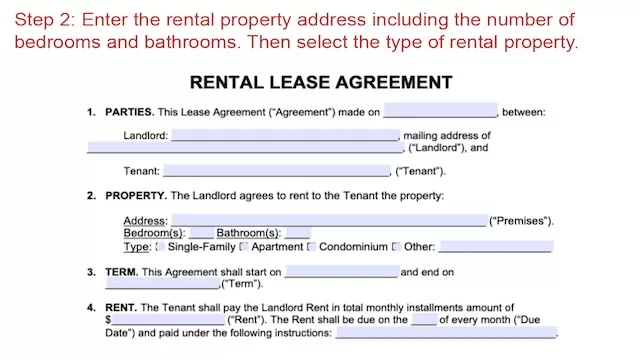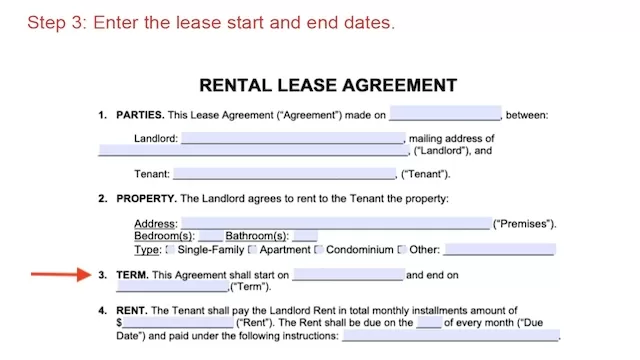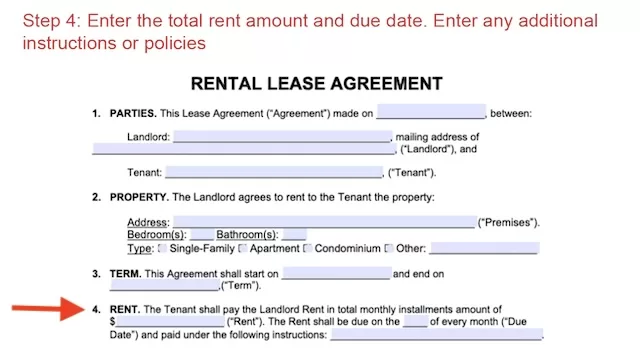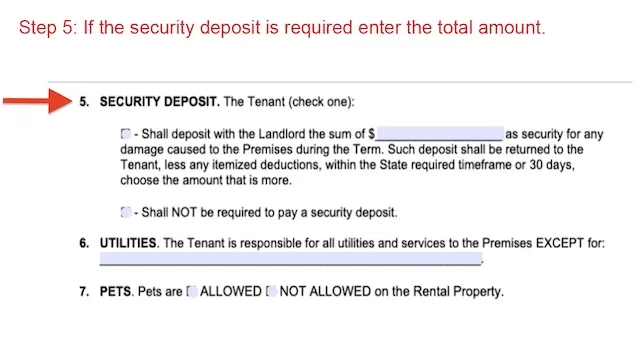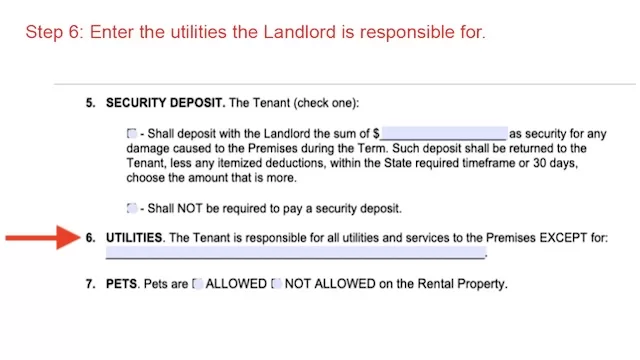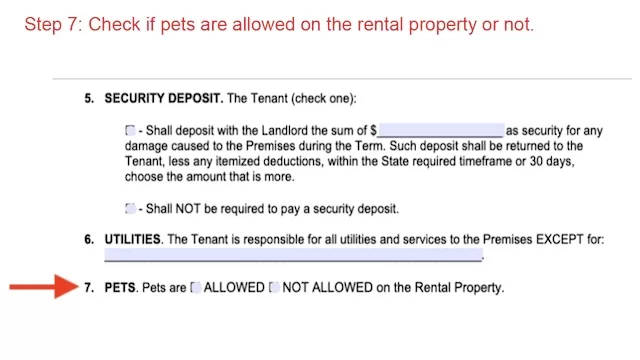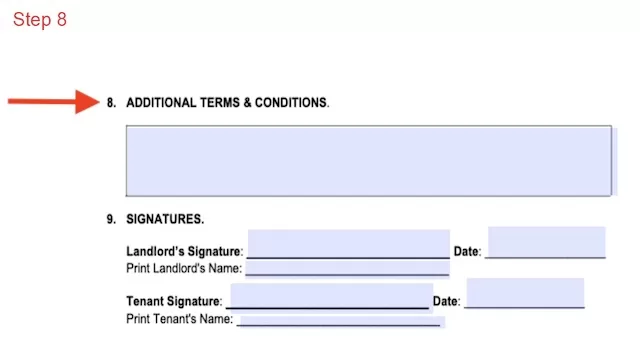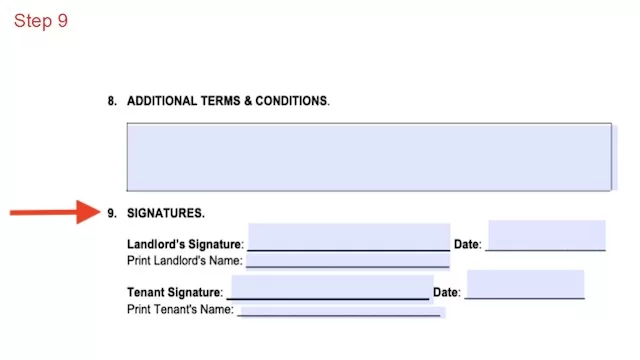Forms By State
- Alabama
- Alaska
- Arizona
- Arkansas
- California
- Colorado
- Connecticut
- Delaware
- D.C.
- Florida
- Georgia
- Hawaii
- Idaho
- Illinois
- Indiana
- Iowa
- Kansas
- Kentucky
- Louisiana
- Maine
- Maryland
- Massachusetts
- Michigan
- Minnesota
- Mississippi
- Missouri
- Montana
- Nebraska
- Nevada
- New Hampshire
- New Jersey
- New Mexico
- New York
- North Carolina
- North Dakota
- Ohio
- Oklahoma
- Oregon
- Pennsylvania
- Rhode Island
- South Carolina
- South Dakota
- Tennessee
- Texas
- Utah
- Vermont
- Virginia
- Washington
- West Virginia
- Wisconsin
- Wyoming
Key Elements: For Apartments, Houses and Condominiums
The basic 1-page lease agreement form is short and simple and fortunately the fill-able blanks can be extended as long as you need. This form summarizes the legal basics of an average standard lease into a short and easy on the eyes read including basic legal points.
Each state has its own updated local laws therefore we offer separate 1-page lease agreements with tailored up to date local laws for all 50 US states and the city of Washington, DC.
Most Recent US Home Facts
- Population (2023): 334,914,895
- Median Households (2022): 125,736,353
- Median Household Income (2022): $75,149
- Owner-occupied Households (2022): 64.8%
Source: U.S. Census Bureau
How to Write a Simple 1-Page Lease Agreement (9 Steps)
This 1-page residential lease agreement outlines the rules for both Landlords and Tenants when renting property in exchange for rent payments. This legal form is is used when rental issues arise that need to be quickly solved before, during, and after the lease duration, i.e. ending lease early (termination), maintenance, rent payments, visitor policies, deposit details, etc.
Step 1
Parties: First input the date then enter the Landlords or Property Owners and the Tenants full legal name/business and mailing address.
Step 2
Property: Enter the rental property address including the number of bedrooms and bathrooms. Then select the type of rental property.
Step 3
Term: Enter the lease start and end dates.
Step 4
Rent: Enter the total rent amount and due date. Enter any additional instructions or policies (i.e. payment methods, Grace Periods, etc.).
Step 5
Security Deposits: Check whether the Landlord requires a security deposit or not. If the security deposit is required enter the total amount.
Step 6
Utilities: Enter the utilities the Landlord is responsible for.
Step 7
Pets: Check if pets are allowed on the rental property or not.
Step 8
Additional Terms and Conditions: Any additional terms and conditions
Step 9
Signatures: The Landlord and Tenant(s) sign and date.
State Security Deposit Laws By State
| State | Maximum Deposit | Notice Period | Sources |
|---|---|---|---|
| Alabama | 1 months’ rent | 60 days | § 8-8-15(b)§ 35-9A-201(a), § 35-9A-201(b) |
| Alaska | 2 months’ rent | 14-30 days | § 34.03.070(a), § 34.03.070(g) |
| Arizona | 1.5 months’ rent | 14 days | § 33-1321 |
| Arkansas | 2 months’ rent | 60 days | § 18-16-304, § 18-16-305 |
| California | 1 months’ rent | 21 days | § 1950.5 |
| Colorado | 2 months’ rent | 1-2 months | § 38-12-102.5, § 38-12-103 |
| Connecticut | 1-2 months’ rent | 21-15 days | § 47a-21 |
| Delaware | 1 month’s rent | 20 days | § 1301A |
| Florida | No Limit | 15-30 days | § 83.49(3)(a) |
| Georgia | 2 months rent | 30 days | § 44-7-30.1, § 44-7-34 |
| Hawaii | 1 month’s rent | 14 days | § 521-44 |
| Idaho | No limit | 21-30 days | § 6-321 |
| Illinois | No limit | 30-45 days | § 765 ILCS 710 |
| Indiana | No limit | 45 days | § 32-31-3-12 |
| Iowa | 2 months’ rent | 30 days | § 562A.12 |
| Kansas | 1 month’s rent (unfurnished), 1.5 months’ rent (furnished) | 14-30 days | § 58-2550 |
| Kentucky | No limit | 60 days | § 383.580(6) |
| Louisiana | No limit | 1 month | § 9:3251§ 6032 |
| Maine | 2 months’ rent | 21-30 days | § 6032, § 6033 |
| Maryland | 1 month’s rent | 45 days | § 8–203 |
| Massachusetts | 1 month’s rent | 30 days | Chapter 186, Section 15B |
| Michigan | 1.5 months’ rent | 30 days | § 554.602, § 554.609 |
| Minnesota | No limit | 3 weeks | § 504B.178 |
| Mississippi | No limit | 45 days | § 89-8-21 |
| Missouri | 2 months’ rent | 30 days | § 535.300 |
| Montana | No limit | 10-30 days | § 70-25-202 |
| Nebraska | 1 month’s rent (excluding pet fees) | 14 days | § 76-1416 |
| Nevada | 3 months’ rent | 30 days | NRS 118A.242 |
| New Hampshire | 1 month’s rent or $100 (whichever is greater) | 20-30 days | RSA 540-A:6, RSA 540-A:7 |
| New Jersey | 1.5 months’ rent | 30 days | § 46:8-21.2, § 46:8-21.1 |
| New Mexico | 1.5 months’ rent | 30 days | § 47-8-18 |
| New York | 1 month’s rent | 14 days | § 7-108(e) |
| North Carolina | 1.5-2 months’ rent | 30-60 days | § 42-51, § 42-52 |
| North Dakota | 1 month’s rent (excluding pet deposits) | 30 days | § 47-16-07.1 |
| Ohio | No limit | 30 days | § 5321.16 |
| Oklahoma | No limit | 45 days | § 41-115(B) |
| Oregon | No limit | 31. days | § 90.300 |
| Pennsylvania | 2 months’ rent | 30 days | § 250.511a, § 250.512 |
| South Carolina | No limit | 30 days | § 27-40-410 |
| South Dakota | 1 month’s rent | 14-45 days | § 43-32-6.1, § 43-32-24 |
| Tennessee | No limit | 30 days | § 66-28-301 |
| Texas | No limit | 30 days | § 92.103 |
| Utah | No limit | 30 days | § 57-17-3 |
| Vermont | No limit | 14-16 days | § 4461 |
| Virginia | 2 months’ rent | 45 days | § 55.1-1226(A) |
| Washington | No limit | 30 days | § 59.18.280 |
| West Virginia | No limit | 45-60 days | § 37-6A-2 |
| Wisconsin | No limit | 21 days | § 134.06 |
| Wyoming | No limit | 15-30 days | § 1-21-1208(A) |
National Association of Realtors
For any other questions, refer to the National Association of Realtors (NAR) website – nar.realtor
Landlord’s Access Notice Requirements by State
| State | Required Notice | Statute |
| Alabama | 2 days | § 35-9A-303 |
| Alaska | 24 hours | § 34.03.140 |
| Arizona | 48 hours | § 33-1343 |
| Arkansas | N/A | N/A |
| California | 24 hours (non-emergency), 48 hours (move-out inspection) | § 1954 |
| Colorado | N/A | N/A |
| Connecticut | Reasonable notice | § 47a-16 |
| Delaware | 48 hours | Title 25 § 5509 |
| Florida | 24 hours | § 83.53 |
| Georgia | N/A | N/A |
| Hawaii | 2 days | § 521-53 |
| Idaho | N/A | N/A |
| Illinois | N/A | N/A |
| Indiana | Reasonable notice | § 32-31-5-6 |
| Iowa | 24 hours | § 562A.19 |
| Kansas | Reasonable notice | § 58-2557 |
| Kentucky | 2 days | § 383.615 |
| Louisiana | N/A | N/A |
| Maine | 24 hours | § 6025 |
| Maryland | N/A | N/A |
| Massachusetts | Reasonable notice | Sanitary Code (410.810) |
| Michigan | N/A | N/A |
| Minnesota | “Reasonable notice” (no less than 24 hours) | § 504B.211 |
| Mississippi | N/A | N/A |
| Missouri | N/A | N/A |
| Montana | 24 hours | § 70-24-312 |
| Nebraska | 24 hours | § 76-1423 |
| Nevada | 24 hours | NRS 118A.330 |
| New Hampshire | Reasonable notice | RSA 540-A:3 |
| New Jersey | 1 day | § 5:10-5.1 |
| New Mexico | 24 hours | § 47-8-24 |
| New York | N/A | N/A |
| North Carolina | N/A | N/A |
| North Dakota | Reasonable notice | § 47-16-07.3 |
| Ohio | 24 hours | § 5321.04 |
| Oklahoma | 1 day | § 41-128 |
| Oregon | 24 hours | § 90.322 |
| Pennsylvania | N/A | N/A |
| Rhode Island | 2 days | § 34-18-26 |
| South Carolina | 24 hours | § 27-40-530 |
| South Dakota | 24 hours | § 43-32-32 |
| Tennessee | 24 hours | § 66-28-403 |
| Texas | N/A | N/A |
| Utah | 24 hours | § 57-22-4 |
| Vermont | 48 hours | § 4460 |
| Virginia | 24 hours | § 55.1-1229(A) |
| Washington | 2 days (repairs), 1 day (showings) | § 59.18.150 |
| West Virginia | N/A | N/A |
| Wisconsin | Advance notice | § 704.05(2) |
| Wyoming | N/A | N/A |
What local State and national Federal laws do Landlords need to know when renting property to Tenants?
- Local Laws: Including rental license, housing codes, occupancy limits, rental inspections and landlord-tenant regulations.
- State Laws: regulations including security deposits, eviction procedures, lease agreements, habitability standards, and anti-discrimination laws.
- Federal Laws: Fair Housing Act, Fair Credit Reporting Act (FCRA), Americans with Disabilities Act (ADA), and the Lead-Based Paint Disclosure Form.
- Federal Regulations: Property tax laws, environmental regulations, and national health and safety codes.
- Zoning Laws
- Landlord Liability Laws
What do Landlords get sued the most for?
- Maintenance and Repairs: Plumbing problems, electrical issues and structural defects that lead to Tenant injury or property damage.
- Health and Safety Violations: Landlords who fail to provide heating, sanitation or pest infestations.
- Discrimination: Landlords who refuse to rent to Tenants based on race, ethnicity, religion, or disability.
Frequently Asked Questions
What’s the Difference Between Simple and Standard Residential Lease Agreements?
- Simple Residential Lease Agreement: Basic terms and conditions.
- Standard Residential Lease Agreement: Comprehensive list of the terms and conditions.
When to hire a Real Estate Agent or Broker?
Landlords and property owners who decide to let a professional handle these tasks should consider what general practices to follow when hiring a real estate broker. The National Association of Realtors provides the updates rules and laws on independent contractors and the pros and cons of hiring a broker through an agency.
How to find owner of property by address for free?
Search property online or go to the local tax assessors office or the local county clerk’s office.
Can a property owner block an easement?
No unless the owner has specific legal circumstances that allows them to block the easement.
What is a Tenant?
A Tenant is an individual whom rents property from a Landlord or owner in exchange for rent payments.
What rights do Tenants have without a lease?
Habitable living conditions, discrimination protection, and prior notice before eviction.
What is Tenant insurance?
Tenant insurance (renters insurance) provides insurance coverage for personal property and liability within the rental property. This insurance can cover more depending on the options and coverage and on the amount the Tenant is willing to spend on the insurance.
How much is Tenant insurance?
The amount for Tenant insurance is usually between $10-$30 per month.
What is tenants-in-common?
Tenants-in-common is when two or more individuals own one property together but owns each share separately allowing them to each sell, mortgage or transfer their share without the consent of the other owners.
What to do with mail from previous Tenant or Property Owner?
Write on the mail “Return to Sender” and put back in the mailbox.
How to evict a Tenant?
Check local laws as the process is different depending on jurisdiction.
How much does a Tenant lawyer cost?
There’s no one price for Tenant lawyers. It’s recommended to get a personal referral if possible or do your research and consult in person with lawyers before agreeing to anything in writing.
